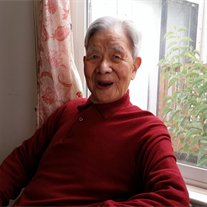Committee of 100 member and prominent structural engineer Y.C. Yang passed away peacefully in his sleep at the age of 97 on February 18th at his home in San Francisco.

Y.C. was born on March 26, 1918 in Haimen, Jiangsu Province, China, the elder of two children. He was educated at Tang Shan Engineering College at Jiaotong University, graduating with a Bachelor’s Degree in Civil Engineering in 1943. He performed construction and design work for railroads in northwestern China and Taiwan, beginning a lifelong association with T.Y. Lin. Yang moved to America in 1956, earning a Master’s Degree in Civil Engineering from the University of Michigan in 1957. He joined T.Y. Lin and Associates (later T.Y. Lin International) in 1959, eventually becoming Chief Engineer, Vice President, and Chairman of the Board.
With T.Y. Lin and other collaborators, Y.C. pioneered the usage of prestressed concrete in construction, designing hundreds of bridges and buildings using this technology. Prominent buildings include the Moscone Center at San Francisco, the Shah Alam Stadium in Malaysia, the Bank of America building in Managua, Nicaragua, and airport terminals in Taipei, San Francisco, and Oakland. Particularly noteworthy bridges include the Smith Avenue High Bridge in St. Paul, the Rio Colorado Bridge in Costa Rica, and the picturesque Guandu bridge in Taiwan. Y.C. took special joy in explaining the engineering challenges and cost savings his team realized.
Y.C. was active in the Chinese American community. He was a founding member of the Chinese Institute of Engineers’ San Francisco chapter, and the chapter’s second president. He helped to found the Chinese Culture Association in San Francisco, united the five JiaoDa alumni groups’ activities, and was an active member of the Committee of 100.
Y.C.’s wife of 61 years, Jane, predeceased him in 2004. He is survived by his sons, John, Steven, and Paul, plus spouses, 7 grandchildren, and 7 greatgrandchildren.
His family believes that Y.C. would prefer contributions towards the ASCE Y.C. Yang Scholarship Foundation, or an Alzheimer research entity, in place of flowers.